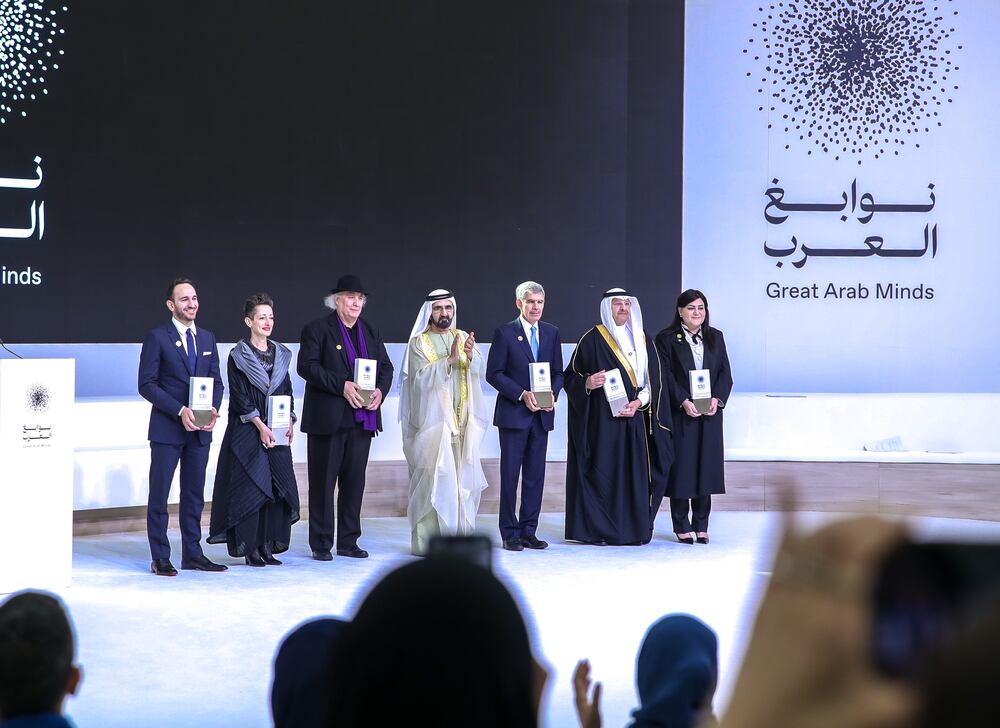
Professor Fadel Adib had his studies in a tumultuous period, while assassinations and car bombings were daily news in Beirut. Undeterred, he pursued his studies. And on Monday, he became the youngest winner of the first ever Great Arab Minds (GAM) award, earning a sum of Dh1 million to continue his work.
Felicitated by His Highness Sheikh Mohammed bin Rashid Al Maktoum, Vice-President and Prime Minister of the UAE and Ruler of Dubai, at a glamorous event held at the Museum of The Future, Fadel said he was humbled by the recognition.
"I feel honoured to be chosen among giants and big names in the field and to sit next to them,” he said. “I feel doubly honoured because this happened in the Arab world." He also expressed his commitment to giving back to the Arab world and hoped to inspire and encourage more innovation within the region.
Currently an associate professor at the Massachusetts Institute of Technology (MIT), it was Fadel’s research and innovations in wireless communication, particularly in identifying objects and vibrations hidden behind walls and under rubble, that earned him the recognition. According to the judging committee, his discoveries have opened up new possibilities for various industries.
Alongside Fadel, other winners included Algerian novelist Prof Waciny Laredj, Egyptian economist Dr Mohamed El-Erian and Lebanese scientist Prof Niveen Khashab. Each award winner will receive Dh1 million to fund their research and development.
In her winning speech, Prof Niveen recalled how she was asked by her colleagues if she was “crazy” for wanting to move back to the Arab World. “In 2008, when I was at Northwestern University in Chicago, I received a call from King Abdullah University of Science and Technology (KAUST) and was offered to be part of the founding academic staff of the university,” she said. “All the colleagues and professors told me: ‘Are you crazy, you cannot launch a scientific career in an Arab country.’ But I accepted this challenge and began my academic career at KAUST. Now, after fifteen years, I am pleased to share with you that the Chemistry Department at my university is not ranked 40th in the world.”
The GAM — the largest scientific movement in the Arab world with a budget of Dh100 million — was designed to seek and identify great minds in the region and reward them for their achievements. The initiative seeks to halt the brain drain trend in Arab nations by incentivising talented individuals to remain in their home countries and utilise available resources. Recognising individuals in six categories — namely natural sciences, architecture and design, engineering and technology, economics, literature and arts and medicine — the award was first announced in 2022.
After a year-long rigorous process, the winners were selected and announced by Sheikh Mohammed on social media platform X in late 2023.
Other winners recognised for their exceptional contributions were:
Dr Hani Najm from the Kingdom of Saudi Arabia, head of the department of adult and paediatric cardiac surgery at Cleveland Clinic Hospital in the United States. Dr Najm was acknowledged in the field of medicine for his groundbreaking work in cardiac surgery.
Dr Mohamed El-Erian, president of Queen's College, University of Cambridge, received the award in the Economics category. His remarkable insights and contributions have reshaped the understanding of global economic trends.
Professor Niveen Khashab, whose groundbreaking research in the natural sciences earned her the Arab Geniuses Award. Her work has pushed the boundaries of scientific knowledge, particularly in her field of expertise.
Prof Lina Ghotmeh was recognised for her exceptional achievements in the Architecture and Design category. Her innovative designs have reimagined urban landscapes and inspired future generations of architects.
Prof Waciny Laredj was celebrated for his remarkable contributions to the Literature and Arts category. His literary prowess and artistic vision have captivated audiences and enriched cultural heritage.
Source: MSN